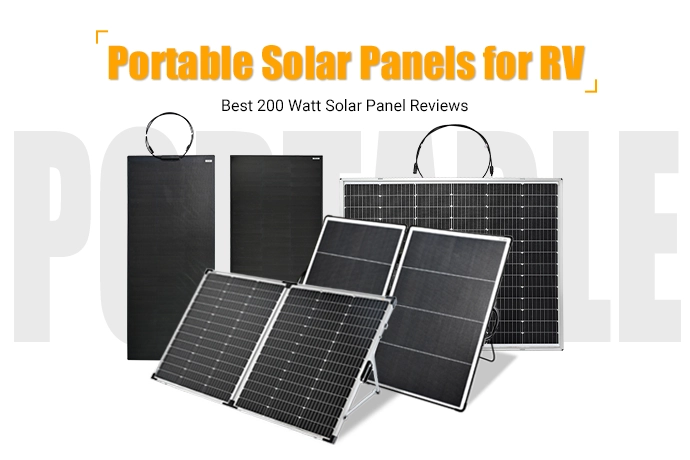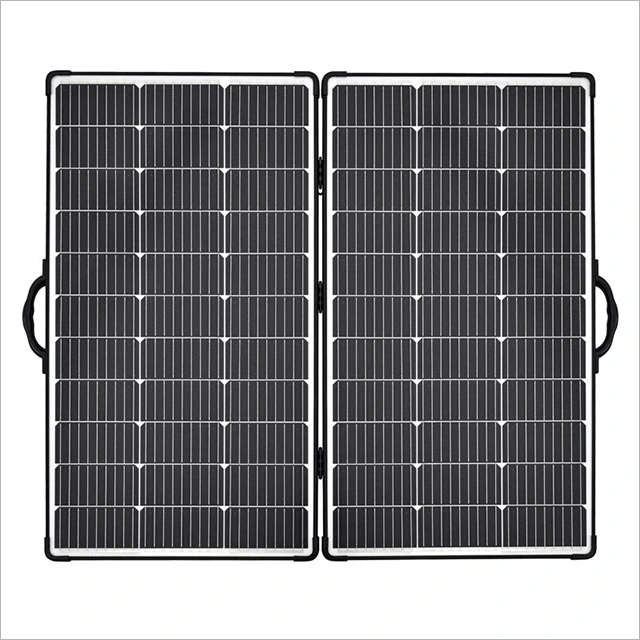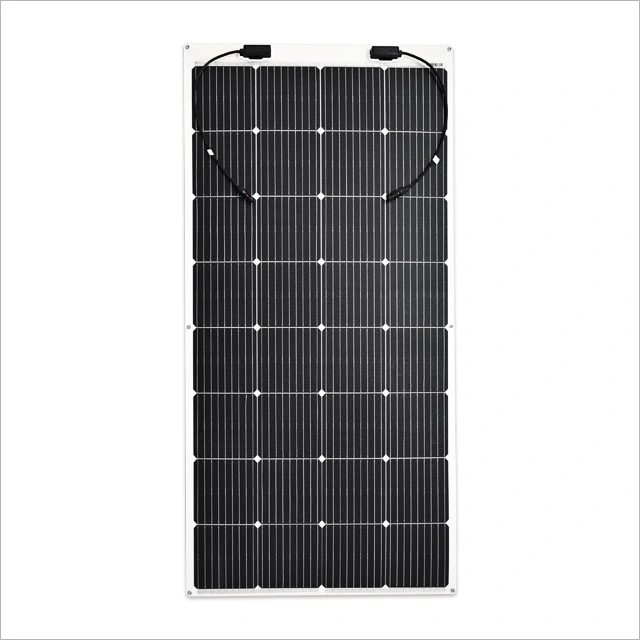With the gradual rise of RV camping, off-grid energy supply has become popular, and according to Amazon, the most popular in 2023 will be portable solar panels for RV, with 200 watt solar panels being the preferred power.
This post will introduce five different portable solar panels for RV, hope you can find the right solar solution for your RV among them, and explore the green outdoor journey without worry.
Portable solar panels for RV preview
- Best Overall—HP-D-200w
- Most Durable—SGF3-200W
- Most Flexible—TF-M/D-200W
- Most Rugged — SGD-M2-200W
- Lightest—SG-MB-200W
Best Overall—HP-D-200W
HP series is the best RV portable solar panels for RV owners because of its outstanding power generation efficiency, excellent performance, and unique design.
The 200w solar panel is able to provide sufficient power load for small electronic devices in the RV to meet the owner’s power needs. In addition to RVs, 200w portable solar panels can also be used in off-grid homes, commercial vehicles, boats, outdoor camping, and outdoor emergencies.
How big is the 200w solar panel? The size of the HP-D 200w solar panel is 1180*900*25mm when unfolded, which is a combination of two 100w solar panels of the same size, and when it is folded up, it is only half the size. Besides, it weighs only 5.88kg, which is light and easy to carry.
HP series RV portable solar panels are suitable for use when stopping for a rest, just need to adjust the bracket and direction according to the sun’s orientation after unfolding to charge the portable power station.
Specification
- Expanded size: 1180*900*25mm
- Folded size: 900*590*50mm
- Weight: 5.5kg
- Product Warranty: 5 years
- Conversion efficiency: 22.0%
Advantages
High efficiency: PERC stacked high-efficiency solar cells are used to ensure optimal energy conversion and maximize power generation.
Lightweight design: Weighing only 5.88kg, the foldable design makes it easy to transport and store.
Waterproof: ETFE splash-proof surface, waterproof up to IP67 with MC4 connector
Disadvantages
As with all 200w solar panels, the rated output is low, if you need more power you can learn about the HP-D-400W.
Most Durable—SGF3-200W
The SGF series was designed for RV use at the beginning of its development, and with the suitcase design, you can quickly take it out or put it away in your RV. Rigid solar panel manufacturing technology is mature, iteratively optimized, and updated to improve performance and power generation efficiency.
The pain point of waterproofing for most folding solar panels is that water seepage and water vapor effects can occur at the panel and frame connection, but the SGF series 200w folding solar panels have overcome this problem well.
The connection between the glass panel and the aluminum alloy frame is encapsulated with solar silicone, which does not allow any moisture to enter. In addition, it also adopts an IP67 rated junction box, which is waterproof and dustproof; it is fully waterproof IP67.
The 10-year warranty is enough to show the quality and standard of portable solar panels for RV. With the glass and aluminum alloy frame and the added edge protection, even in extreme weather, it is rare that the power generation and normal use will be affected due to the damage to the battery cells.
Specification
- Unfolded size: 1183*925*35mm
- Folded size: 925*590*35mm
- Weight: 16.5kg
- Warranty: 10 years
- Conversion efficiency: 22.7%
Advantages
High efficiency: monocrystalline cells are used, and the efficiency of the module is up to 22.7%.
Waterproof: IP67 waterproof, waterproof, and dustproof junction box, panel, and frame connection using solar silicone encapsulation.
Sturdy: glass panel and aluminum alloy frame, durable and stable performance.
Disadvantages.
As a 200w RV portable panel, the weight of 16.5kg is on the heavy side.
Most Flexible—TF-M-200W
Compared with other models, this 200w flexible solar panel may not be considered a portable solar panel in the traditional sense, but for RV owners, being able to carry it easily is another sense of portability and more flexible use.
TF series adopts the patented polymer composite material independently developed by Sungold, which has better performance than ordinary materials and can enhance the aging, UV, and corrosion resistance of solar panels, and prolong the service life of solar panels.
Compared with rigid solar panels, the biggest advantage of flexible solar panels is that they are thin and light and have a certain bending radius. 200-watt solar panels of the TF series weigh only 3.63kg and have a maximum bending radius of 240mm, which enables them to be used in areas that are not suitable for solar panels.
This allows them to be used on irregular surfaces, such as on the roof of a caravan, on the hood of a truck or caravan, or even on the ground when stopping for a break, where they can absorb the sun’s rays to charge a portable power station.
Specification
- Size: 1480*710*2mm
- Weight: 3.63kg
- Warranty: 5 years
- Conversion efficiency: 22.8%
- Maximum bending arch height: 240mm
Advantages
Waterproof: IP67 waterproof rating, overall waterproof design.
Thin and light: weight only 3.63kg, thickness only 2mm, can be bent to a certain extent.
High impact resistance: ETFE surface material anti-corrosion and salt spray, strong UV resistance.
Disadvantages
TF series 200w flexible solar panel without bezel and bracket.
Most Rugged — SGD-M2-200W
In the SGD series of solar panels, each substring consists of 36 to 40 connected cut cells to ensure that there is no distance between cells. to provide higher power generation efficiency.
The SGD Series solar panels are the most suitable of the five solar panels for fixed installation on the roof of an RV to continuously supply solar power to replenish the RV.
In addition to being used individually and independently like other 200w solar products, the SGD is the most suitable for multiple solar panels to be used in series or parallel, and you can use it as an RV solar off-grid solution in addition to portable solar panels for plan B.
Specification
- Size: 1520*670*35mm
- Weight: 11.09 kg
- Warranty: 10 years
- Conversion efficiency:22.0%
Advantages
Rugged: Traditional glass panel with proven technology and durability.
High efficiency: Maximizes performance and reduces shading effects with high-performance bypass diodes
Easy to install: pre-drilled holes on the back for quick installation and fixing
Disadvantages
Less portable, and more suited to fixed installations on RV roofs.
Lightest—SG-MB-200W
The SG-MB-200w is the most suitable solar panel among several products for double-decker-proof RVs, especially for owners with railed decks on the upper level. It can be removed and used in addition to being fixed to the railing.
The high power output makes it perfect for RV travel, and it can be provided to power RV lighting in addition to charging equipment.
The composite backsheet design makes the solar panel durable and able to withstand outdoor use in different environments, as well as the movement of various combination applications without worrying about damaging the battery and affecting the power output of the module.
Specification
- Size: 1155*945*5.5mm
- Weight: 4.65 kg
- Conversion efficiency:22.7%
- Cell Type: Monocrystalline
Advantages
Lightweight: lightweight, easy to carry, weighs only 4.65kg
Multi-purpose use: With a removable mounting bracket, it can be used in caravans and balconies.
Highest output portable solar panel
Disadvantages
The 200w solar panel is on the expensive side.
Choosing the Ideal Solar Panel for Your RV
Many of you may be asking besides the 5 RV portable solar panels above, what are the factors to consider when choosing other solar panels for RVs to ensure that my energy needs are met?
Here are some suggestions to help you choose the right solar panel for your RV:
Energy Needs Assessment
First, you need to assess the energy needs of your RV. Consider the equipment you want the solar panels to power, such as lights, refrigerators, electronics, etc. Calculate the total power consumption of these devices. Calculate the total power consumption of these devices to determine the required solar panel power.
SOLAR PANEL POWER
Choose the right solar panel power for your energy needs. Generally speaking, 200 to 400 watts of solar panels are a good choice for most RVs.
Solar Panel Type
There are different types of solar panels such as monocrystalline, polycrystalline, and thin film. Monocrystalline and polycrystalline solar panels are generally more efficient and are suitable for limited installation space. Thin-film solar panels are thin and lightweight but less efficient.
Installation Space
Measure the space available in your RV for the solar panels. Ensure that the size of the solar panel is appropriate for your chosen mounting location.
Battery Storage
Consider whether you need a battery storage system to utilize solar energy at night or on cloudy days. Battery capacity should be selected based on your energy needs and usage habits.
CHARGE CONTROLLER
Select an appropriate charge controller to ensure stability and safety when charging the solar panels to the batteries.
Tilt and Orientation
Consider the tilt and orientation of your solar panels to maximize the use of solar energy. Some mounting brackets allow you to adjust the angle of the solar panel.
Budget
Determine your budget range and choose the right solar panels and accessories within that range.
Ultimately, your choice should be based on your specific situation and needs. Choosing the right solar panels for your RV’s size, usage habits, and budget will help provide you with a reliable source of independent energy.
FAQs
How big is a 200 watt solar panel?
You can refer to the size of those five 200w solar panels above Sungold, which vary in size on the market.
The physical dimensions of a 200-watt solar panel can vary based on the specific manufacturer and design. However, as a general guideline, a standard 200-watt solar panel typically measures around 1.5 meters (about 59 inches) in length and about 1 meter (about 39 inches) in width. These dimensions are approximate and can vary slightly between different brands and models.
How many amps 200 watt solar panel?
The number of amps produced by a 200-watt solar panel depends on the voltage of the panel. The relationship between power (in watts), current (in amps), and voltage (in volts) is described by the formula: Power (W) = Current (A) × Voltage (V).
Assuming the solar panel operates at a standard voltage of 12 volts (common for many RV systems):
200 watts = Current (A) × 12 volts
Solving for current (A):
Current (A) = 200 watts / 12 volts ≈ 16.67 amps
So, a 200-watt solar panel operating at 12 volts can produce approximately 16.67 amps of current.
What will a 200-watt solar panel run in an RV?
A 200-watt solar panel can provide a significant amount of power for various systems and appliances in an RV, allowing you to rely less on grid power or generators. However, the exact appliances you can power will depend on factors such as the efficiency of the solar panel, the amount of sunlight available, and the energy consumption of your devices. Here are some examples of what a 200-watt solar panel might be able to run in an RV:
Lights: LED lights are energy-efficient, and a 200-watt solar panel should be able to power several LED lights for a good portion of the day and night.
Small Appliances: Energy-efficient small appliances like laptops, smartphones, tablets, and small fans can be powered by a 200-watt solar panel.
Charging Devices: You can charge various devices such as cameras, portable speakers, power banks, and other electronics using the solar panel’s power.
TV and Entertainment Systems: Some modern RV TVs and entertainment systems are designed to be energy-efficient. A 200-watt solar panel might be able to power a TV and media devices for a reasonable amount of time.
Ventilation Fans: Roof fans or vent fans are important for maintaining airflow and temperature inside the RV. A 200-watt solar panel can power ventilation fans, helping with cooling and air circulation.
Refrigerator: If your RV’s refrigerator is energy-efficient and has a low power consumption, a 200-watt solar panel might contribute to keeping it running, especially during daylight hours.
Small Heaters: While running electric heaters from solar power can be energy-intensive, a 200-watt solar panel could potentially power small heaters for short periods, depending on the weather.
Battery Charging: The solar panel can help keep your RV’s batteries charged, ensuring they are ready to supply power during the night or on cloudy days.
It’s important to note that the actual power output from a solar panel can vary based on factors like sunlight intensity, angle, shading, and panel efficiency. To get the most out of a 200-watt solar panel, it’s a good idea to use energy-efficient appliances and consider installing an energy management system with a battery storage solution to store excess energy for use when the sun isn’t shining.
Can a 200-watt solar panel run a refrigerator?
What can 200w solar panel run? The ability of a 200-watt solar panel to run a refrigerator depends on several factors, including the power consumption of the refrigerator, the efficiency of the solar panel, the available sunlight, and the capacity of the battery system (if used).
Refrigerators vary widely in terms of power consumption, but generally, residential-sized refrigerators can consume anywhere from 100 to 800 watts, with an average around 150-200 watts while running. Some smaller, energy-efficient RV or off-grid refrigerators might have lower power requirements.
Considering an average running power of 150-200 watts for a refrigerator:
Energy Efficiency: If the refrigerator’s power consumption is around 150-200 watts, a 200-watt solar panel might be able to power it under optimal conditions when the sun is shining brightly. However, keep in mind that solar panel output can vary due to factors like shading and panel efficiency.
Battery Storage: To ensure the refrigerator runs during periods when the sun is not shining (such as at night), you would need to store excess energy in batteries. A 200-watt solar panel could potentially charge a battery bank that can then power the refrigerator when solar production is low or absent.
Backup Power: It’s important to have a backup power source, such as a generator or an alternative power hookup, in case of prolonged cloudy days or higher energy demands.
Efficiency and Insulation: The refrigerator’s efficiency and insulation play a significant role. Well-insulated and energy-efficient refrigerators will consume less power, making them more suitable for solar-powered setups.
Keep in mind that powering a refrigerator using solar energy can be challenging due to its intermittent nature. Energy consumption can be higher during startup and when the compressor kicks in. Additionally, other appliances and devices in your RV will also be drawing power.
Before attempting to power a refrigerator with a 200-watt solar panel, it’s advisable to calculate your energy needs, consult with solar professionals, and consider using energy-efficient appliances and a suitable battery system to ensure a reliable power supply.
Can I mix 100 watt and 200 watt solar panels?
Yes, you can mix different wattage solar panels, such as using both 100-watt and 200-watt panels in the same solar system. However, there are a few important considerations to keep in mind:
Voltage Compatibility: Make sure that the voltage ratings of the panels are compatible. Panels with different wattages might have slightly different voltage outputs, but they should fall within a similar range. Mixing panels with significantly different voltage outputs can lead to inefficient power production and potential damage to the panels or other components in the system.
Parallel or Series Connection: Solar panels can be connected in parallel or series configurations. Parallel connections maintain the voltage while increasing the current capacity, while series connections increase the voltage while maintaining the current capacity. When mixing different wattages, consider how you’re connecting the panels and how it will affect the overall performance of the system.
Current Mismatch: Panels with different wattages will have different current outputs. When connected in parallel, the panels will contribute their currents, so the panel with the lowest current output might limit the overall current capacity of the system. This could potentially affect the system’s efficiency and power production.

















